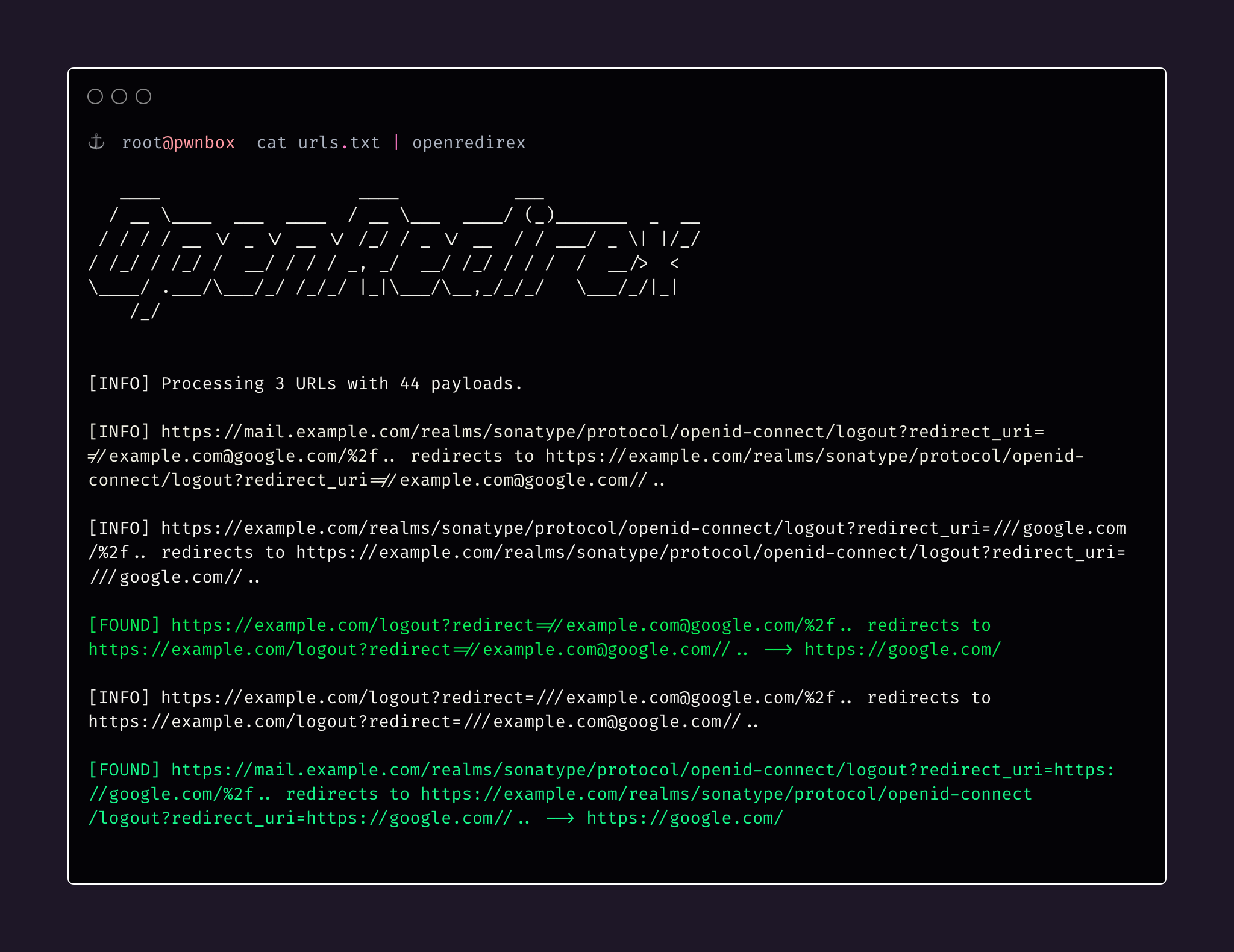https://github.com/devanshbatham/OpenRedireX
A fuzzer for detecting open redirect vulnerabilities
https://github.com/devanshbatham/OpenRedireX
open-redirect openredirect openredirect-fuzzer openredirect-scanner
Last synced: 8 months ago
JSON representation
A fuzzer for detecting open redirect vulnerabilities
- Host: GitHub
- URL: https://github.com/devanshbatham/OpenRedireX
- Owner: devanshbatham
- License: mit
- Created: 2020-04-19T09:37:38.000Z (over 5 years ago)
- Default Branch: master
- Last Pushed: 2024-07-01T20:45:53.000Z (over 1 year ago)
- Last Synced: 2025-03-28T00:14:54.883Z (8 months ago)
- Topics: open-redirect, openredirect, openredirect-fuzzer, openredirect-scanner
- Language: Python
- Homepage:
- Size: 840 KB
- Stars: 736
- Watchers: 16
- Forks: 136
- Open Issues: 3
-
Metadata Files:
- Readme: README.md
- License: LICENSE
Awesome Lists containing this project
- awesome-bugbounty-tools - OpenRedireX - A Fuzzer for OpenRedirect issues (Exploitation / Open Redirect)
- WebHackersWeapons - OpenRedireX
- awesome-hacking-lists - devanshbatham/OpenRedireX - A fuzzer for detecting open redirect vulnerabilities (Python)
README
OpenRedireX
A fuzzer for detecting open redirect vulnerabilities
🏗️ Install
⛏️ Usage
📚 Dependencies

# Install
```sh
git clone https://github.com/devanshbatham/openredirex
cd openredirex
sudo chmod +x setup.sh
./setup.sh
```
# Usage
The script is executed from the command line and has the following usage options:
```sh
openredirex [-p payloads] [-k keyword] [-c concurrency]
```
- `-p`, `--payloads`: File containing a list of payloads. If not specified, a hardcoded list is used.
- `-k`, `--keyword`: Keyword in URLs to replace with payload. Default is "FUZZ".
- `-c`, `--concurrency`: Number of concurrent tasks. Default is 100.
The script expects a list of URLs as input. Each URL should contain the keyword specified by the `-k` option. The script replaces the keyword with each of the payloads, and attempts to fetch the modified URL.
Example usage:
```sh
cat list_of_urls.txt | openredirex -p payloads.txt -k "FUZZ" -c 50
```
List of URLs should look like below:
```
cat list_of_urls.txt
https://newsroom.example.com/logout?redirect=FUZZ
https://auth.example.com/auth/realms/sonatype/protocol/openid-connect/logout?redirect_uri=test
https://exmaple.com/php?test=baz&foo=bar
```
This example reads URLs from the file `list_of_urls.txt`, replaces all the values of the parameters to `FUZZ` (if `--keyword` is not supplied), then again replaces the keyword `FUZZ` or the supplied keyword with each payload from `payloads.txt`, and fetches each URL concurrently, with a maximum of 50 concurrent tasks.
# Dependencies
The script uses the following libraries:
- `argparse` for handling command-line arguments.
- `aiohttp` for making HTTP requests.
- `tqdm` for displaying progress.
- `concurrent.futures` for handling concurrent tasks.
- `asyncio` for managing asynchronous tasks.
You need to install these dependencies before running the script. Most of them are part of the standard Python library. You can install `aiohttp` and `tqdm` using pip:
```sh
pip install aiohttp tqdm
```
You can use this script to check for open redirects in web applications. However, you should only use it on systems that you have been given explicit permission to test.